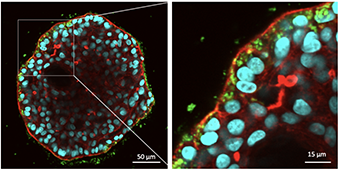Open PhD positions on SuperCol, an innovative training network (ITN)

SuperCol project
Colloidal particles are microscopic or even nanoscopic-sized particles whose surfaces can be functionalised. Their very large surface areas relative to their small volumes means you can load each one with many molecules to deliver and release drugs or bind pathogens and biomarkers at the target site, opening potential for powerful diagnostic and therapeutic systems. The reason that this potential is yet to be exploited is that these functionalities depend on tight and quantitative control over the number, distribution and activity of interface chemical groups which cannot yet be visualized with chemical specificity and at the single-molecule level. The SuperCol ITN project plans to get a closer look at colloidal surfaces both visually and with receptor chemistry in order to aid development of these particle systems. To this end the project will combine super-resolution microscopy, colloidal sciences, and advanced modelling to (a) control, (b) visualize and quantify, and (c) rationally design surface-functionality to advance particle-based biomedical applications. SuperCol establishes a unique and well-structured training network with leading R&D labs from European universities and industry in the domain of correlative microscopy and colloidal sciences. The 15 Early Stage Researchers (ESRs) will form a research team that is embedded in leading industrial and academic R&D labs. This will bridge the gap between the various disciplines by uniting their research efforts to solve the challenges. The SuperCol project is supported by the European Union's Horizon 2020 research and innovation programme Marie Sklodowska-Curie Innovative Training Networks (ITN) under grant No. 860914. The vacancy is open to candidates who are in the first four years (full-time equivalent research experience) of their research careers and have not been awarded a doctoral degree (Eligibility rule), and who have not resided or carried out their main activity (work, studies, etc.) in Belgium for more than 12 months in the 3 years immediately prior to your recruitment (Mobility rule). If you are interested but your situation does not conform to the Mobility rule, please refer to www.supercol.eu to see if there is another position in the SuperCol network that would suit you.
PhD project: Tracking the biological fate of functional nanoparticles using fluorescence microscopy
The PhD is hosted by the Rocha lab at KU Leuven, which develops fluorescence microscopy tools and assays to address biologically relevant questions. The group works at the crossroad between biology, chemistry and nanotechnology. The main imaging modalities use are confocal, multi-photon, single molecule fluorescence (single particle tracking, super- resolution) and multi-plane wide field microscopy. In parallel, we work on the optimization of biomimetic matrices for 3D cell models and functionalization of nanoparticles.Project
The use of nanotechnology in cancer therapy has attracted growing attention over the past decade. Many drug nanocarriers offering considerable advantages over conventional chemotherapy have been developed. While some nanomedicines are already in use in the clinics(eg. Abraxane and Doxil), the clinical output is too low compared to the substantial research ongoing in this field. Promising results in vitro can often not be translated in vivo. This is linked to the in vitro testing of nanocarriers in 2D cultures, which can hardly mimic the complex network of a 3D tumor. To form a bridge between the in vitro and in vivo, it is crucial to test the performance of drug nanocarriers in advanced 3D cell models. The main goal of this position is to evaluate the uptake, inter- and intracellular fate of nanoparticles in 3D cell models of different complexity. These models include multicellular tumor spheroids (self-assembled aggregates of cancer cells grown in a matrix-free environment) and cancer organoids, grown using cells from tumor biopsies. You will use advanced optical (fluorescence)microscopy to characterize the different 3D cell models, selectivity of the particle-cell interactions, the cellular uptake, endosomal escape, and intracellular drug release.
Profile
We are seeking highly motivated candidates that hold a master’s degree in chemistry, biochemistry or nanotechnology related subjects. Experience with optical microscopes, nanoparticle functionalization or 3D cell culture is a plus. The candidate should be open to interdisciplinary science and collaborations. KU Leuven offers in this respect an ideal environment with a large number of science groups working on different (applied) subjects.
Offer
Interested?
To apply for this position, please follow the application tool and enclose- full CV – mandatory,
- motivation letter – mandatory,
- full list of credits and grades of both BSc and MSc degrees (as well as their transcription to English if possible) – mandatory (when you haven’t finished your degree yet, just provide us with the partial list of already available credits and grades),
- proof of English proficiency (TOEFL, IELTS, ...) – if available, and
- two reference letters – if available
Informal enquiries and applications can be submitted to Prof. Susana Rocha (email). You can apply for this job no later than February 15, 2020 via the online application tool. KU Leuven seeks to foster an environment where all talents can flourish, regardless of gender, age, cultural background, nationality or impairments. If you have any questions relating to accessibility or support, please contact us at diversiteit.HR@kuleuven.be.
